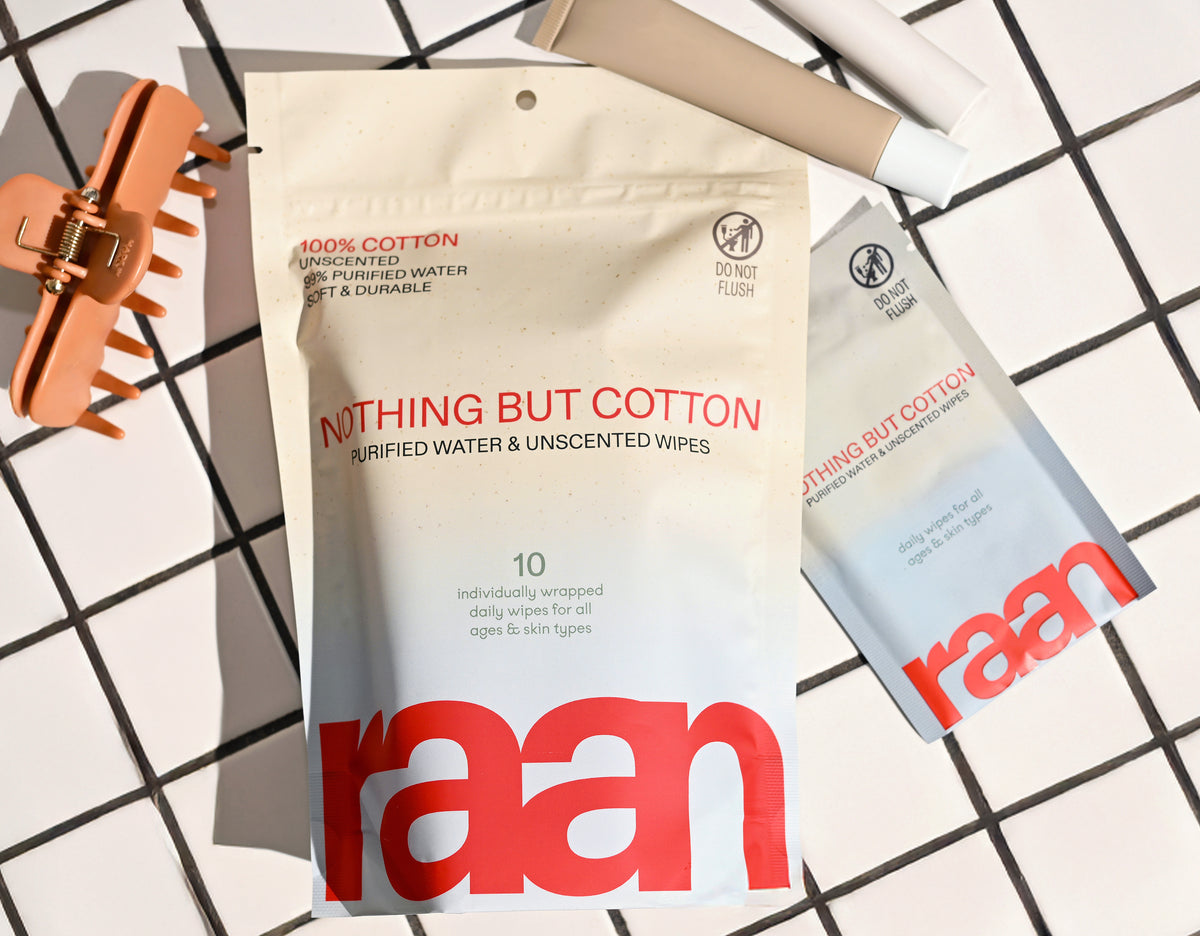The Real Story Behind Wipes Made in the USA
When you reach for a wipe - whether it's for your newborn's sensitive skin, a quick face refresh, or cleaning up life's everyday messes - you're probably not thinking about where it was manufactured. But maybe you should be.
Key Takeaways
- Many people overlook the importance of where wipes are manufactured when choosing a product.
- Wipes are used for a variety of purposes, including for newborns, personal care, and cleaning.
- The origin of wipes can impact their quality and safety.
- Considering the manufacturing location of wipes is important for informed purchasing decisions.
Table of Contents
Wipes made in the USA represent more than just domestic manufacturing. They're about transparency, safety standards, and knowing exactly what you're bringing into your home. In a market flooded with mystery ingredients and hidden plastics, American-made wipes offer something increasingly rare: accountability.
The billion-dollar wipes industry has a problem. Most conventional options - even those with clean-sounding names - rely on synthetic materials, vague ingredient lists, and manufacturing processes that prioritize cost over safety. But a new wave of USA-manufactured wet wipes is changing that standard entirely.
Quick Answer
Wipes made in the USA must meet stricter regulatory standards, offer greater ingredient transparency, and typically use higher-quality materials than imported alternatives. Key benefits include FDA oversight, clearer labeling requirements, and better supply chain accountability. Look for certifications like EWG Verified, unbleached cotton materials, and specific manufacturing location details to verify authenticity.
What Actually Makes USA-Made Wipes Different

The "Made in the USA" label isn't just marketing - it comes with legal requirements and manufacturing standards that directly impact what ends up on your skin.
Under FTC guidelines, products labeled "Made in the USA" must be "all or virtually all" made domestically. For wipes, this means the base material, formulation, and final assembly happen on American soil. But here's what that really means for you:
Pros
- Stricter ingredient oversight - FDA regulations require clearer disclosure of what's actually in the formula
- Material transparency - You can trace the cotton source, water purification process, and preservative choices
- Quality consistency - Domestic facilities follow standardized manufacturing protocols
- Faster response times - Issues get addressed quickly without international supply chain delays
Cons
- Higher price point - American labor and materials cost more than overseas alternatives
- Limited variety - Fewer specialty formulations compared to the broader imported market
The difference becomes obvious when you compare ingredient lists. A typical imported wipe might list "purified water, cleansing agents, preservative system" - vague terms that tell you nothing. American-made wipes, especially those targeting conscious consumers, break it down: purified water, sodium benzoate (food-grade preservative), organic aloe, citric acid for pH balance.
That level of specificity isn't accidental. It's the result of manufacturing in a regulatory environment that values transparency over trade secrets.
Core Materials Used in USA-Manufactured Wipes
The material story is where wipes made in the USA truly shine. While imported alternatives often rely on synthetic blends and mystery fibers, American manufacturers increasingly embrace transparency - both in sourcing and in what they're willing to tell you about their process.
Cotton vs. Synthetic: The Material Revolution
Most conventional wipes use a blend of polyester and rayon - essentially plastic fibers that feel soft but break down into microplastics over time. USA-manufactured wet wipes are leading a shift toward natural cotton, particularly unbleached varieties that preserve the fiber's inherent gentleness.
100% Cotton Wipes
- Biodegradable - Breaks down naturally without leaving microplastics
- Hypoallergenic - No synthetic irritants or chemical processing residue
- Absorbent - Natural fibers hold more liquid without falling apart
- Traceable - You can verify the cotton source and processing methods
Synthetic Blend Wipes
- Cost-effective - Cheaper to produce at scale
- Tear-resistant - Synthetic fibers create stronger bonds
- Consistent texture - Manufacturing variations are minimal
The ingredient transparency extends beyond the base material. Locally produced cotton wipes typically use simpler formulations: purified water (often 99% of the formula), food-grade preservatives like sodium benzoate and potassium sorbate, organic aloe for skin conditioning, and citric acid for pH balance.
What American Manufacturers Are Leaving Out
Here's where domestic oversight makes a real difference. USA-made wipes increasingly avoid ingredients that raise safety concerns:
- Parabens and formaldehyde-releasing preservatives - Linked to hormonal disruption
- Synthetic fragrances - Common allergens that aren't required to be disclosed in detail
- Bleaching agents - Can leave chemical residues and weaken natural fibers
- SLS and harsh surfactants - Strip natural skin oils and cause irritation
This isn't about fear-mongering - it's about recognizing that simpler formulations work better for sensitive skin. When you're dealing with newborn skin or your own face after a long day, you want ingredients you can pronounce and understand.
The shift toward domestic eco wipes reflects a broader understanding: the fewer ingredients needed to do the job effectively, the better. It's material science focused on function rather than marketing.
Regulatory Standards: Why USA Manufacturing Matters
The regulatory framework surrounding wipes made in the USA creates accountability that's often missing in imported alternatives. The FDA oversees personal care wipes, while the EPA regulates cleaning and disinfectant varieties - meaning American manufacturers must meet specific safety and labeling requirements.
This oversight translates into real benefits. USA-manufactured wet wipes must clearly disclose ingredients, meet contamination standards, and follow Good Manufacturing Practices (GMP). When a facility is inspected by federal regulators, you're getting transparency that's legally enforced, not just marketing-driven.
Key regulatory advantage: American manufacturers can't hide behind vague terms like "proprietary blend" or "natural essence" without backing up their claims. The FTC requires substantiation for any safety or performance claims made on packaging. For more on evolving labeling standards, see the national wipes labeling legislation.
For made in USA baby wipes, this regulatory oversight becomes even more critical. Products designed for infant use face stricter contamination limits and must avoid ingredients known to cause skin sensitization. The result is formulations that prioritize safety over cost-cutting.
The Environmental Manufacturing Story
Beyond ingredients, the environmental impact of domestic eco wipes extends to manufacturing processes. American facilities increasingly adopt water recycling systems, renewable energy sources, and waste reduction protocols that would be difficult to verify in overseas production.
The packaging story matters too. Many USA-made wipes now use 70% less plastic than conventional options by eliminating hard plastic lids and incorporating post-consumer recycled content. When transportation distances are shorter, the carbon footprint shrinks significantly - especially for bulk purchases.
- Reduced shipping emissions - Domestic production cuts transport-related carbon footprint
- Verifiable sustainability claims - You can actually visit or research the manufacturing facilities
- Circular economy support - American manufacturers increasingly source recycled materials locally
- Water stewardship - U.S. facilities face stricter wastewater treatment requirements
Making the Switch: What to Expect
Transitioning to American-made wipes often means adjusting expectations around texture and performance. Cotton-based wipes feel different from synthetic blends - they're typically thicker, more absorbent, but may tear more easily if you're used to pulling aggressively.
The ingredient simplicity means no artificial fragrance to mask odors or create a "fresh" scent. Instead, you get the actual cleaning power of the formula without sensory marketing tricks. For sensitive skin, this absence of fragrance and dyes often eliminates irritation that users didn't even realize they were experiencing. For more tips on gentle skincare, check out our guide to best face products for sensitive skin.
Industry insight: The most effective locally produced cotton wipes rely on mechanical action (the physical wiping) rather than harsh chemicals to remove dirt and bacteria. This approach works better for daily use and reduces the risk of skin barrier disruption.
Price-wise, expect to pay 15-30% more for genuinely American-manufactured options. However, the per-use cost often balances out because cotton wipes are more durable and absorbent - you typically need fewer wipes per cleaning task.
The wipes landscape is shifting toward transparency, sustainability, and genuine safety - and American manufacturers are leading that change. When you choose wipes made in the USA, you're supporting not just domestic manufacturing, but a fundamentally different approach to personal care that prioritizes your health and environmental responsibility over cost-cutting and marketing gimmicks.
Frequently Asked Questions
Why choose wipes manufactured in the USA?
Choosing wipes made in the USA means supporting local manufacturing that follows transparent practices and rigorous oversight. It also ensures faster quality control feedback loops and reduces the risks associated with long, complex supply chains that can obscure ingredient and material origins.
Are USA-made wipes subject to stricter quality standards?
Yes, wipes made in the USA typically adhere to stricter manufacturing and safety regulations compared to many international producers. This includes compliance with federal guidelines for ingredient transparency, material sourcing, and environmental standards, offering you a higher level of trust and consistency.
Does buying USA-made wipes reduce carbon footprint?
Buying wipes made in the USA can help reduce your carbon footprint by minimizing transportation emissions linked to overseas shipping. Local production cuts down on the distance raw materials and finished products travel, contributing to a more sustainable supply chain overall.
Where does RAAN source raw materials for its USA-made wipes?
RAAN sources all its raw materials, including unbleached, 100 % cotton, from trusted suppliers with a focus on earth-derived and minimally processed inputs. Our cotton is natural and unbleached, carefully selected to maintain purity and quality, and we pair it with a simple, EWG-verified formula made in the USA.
Are American-made wipes more expensive than imports?
American-made wipes often carry a slightly higher price due to the costs of local labor, stricter quality controls, and sustainable sourcing practices. However, this investment reflects transparency, safety, and environmental responsibility-factors that conventional imports frequently overlook.





